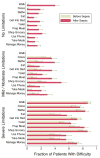Long-term cognitive impairment and functional disability among survivors of severe sepsis
- PMID: 20978258
- PMCID: PMC3345288
- DOI: 10.1001/jama.2010.1553
Long-term cognitive impairment and functional disability among survivors of severe sepsis
Abstract
Context: Cognitive impairment and functional disability are major determinants of caregiving needs and societal health care costs. Although the incidence of severe sepsis is high and increasing, the magnitude of patients' long-term cognitive and functional limitations after sepsis is unknown.
Objective: To determine the change in cognitive impairment and physical functioning among patients who survive severe sepsis, controlling for their presepsis functioning.
Design, setting, and patients: A prospective cohort involving 1194 patients with 1520 hospitalizations for severe sepsis drawn from the Health and Retirement Study, a nationally representative survey of US residents (1998-2006). A total of 9223 respondents had a baseline cognitive and functional assessment and had linked Medicare claims; 516 survived severe sepsis and 4517 survived a nonsepsis hospitalization to at least 1 follow-up survey and are included in the analysis.
Main outcome measures: Personal interviews were conducted with respondents or proxies using validated surveys to assess the presence of cognitive impairment and to determine the number of activities of daily living (ADLs) and instrumental ADLs (IADLs) for which patients needed assistance.
Results: Survivors' mean age at hospitalization was 76.9 years. The prevalence of moderate to severe cognitive impairment increased 10.6 percentage points among patients who survived severe sepsis, an odds ratio (OR) of 3.34 (95% confidence interval [CI], 1.53-7.25) in multivariable regression. Likewise, a high rate of new functional limitations was seen following sepsis: in those with no limits before sepsis, a mean 1.57 new limitations (95% CI, 0.99-2.15); and for those with mild to moderate limitations before sepsis, a mean of 1.50 new limitations (95% CI, 0.87-2.12). In contrast, nonsepsis general hospitalizations were associated with no change in moderate to severe cognitive impairment (OR, 1.15; 95% CI, 0.80-1.67; P for difference vs sepsis = .01) and with the development of fewer new limitations (mean among those with no limits before hospitalization, 0.48; 95% CI, 0.39-0.57; P for difference vs sepsis <.001 and mean among those with mild to moderate limits, 0.43; 95% CI, 0.23-0.63; P for difference = .001). The declines in cognitive and physical function persisted for at least 8 years.
Conclusions: Severe sepsis in this older population was independently associated with substantial and persistent new cognitive impairment and functional disability among survivors. The magnitude of these new deficits was large, likely resulting in a pivotal downturn in patients' ability to live independently.
Conflict of interest statement
The authors report no conflict of interest. TJI had full access to all of the data in the study and takes responsibility for the integrity of the data and the accuracy of the data analysis.
Figures




Comment in
-
The lingering consequences of sepsis: a hidden public health disaster?JAMA. 2010 Oct 27;304(16):1833-4. doi: 10.1001/jama.2010.1546. JAMA. 2010. PMID: 20978262 No abstract available.
-
Cognitive and functional impairment after severe sepsis.JAMA. 2011 Feb 16;305(7):673-4; author reply 674. doi: 10.1001/jama.2011.142. JAMA. 2011. PMID: 21325182 Free PMC article. No abstract available.
-
[Long-term consequences of severe sepsis].Med Mal Infect. 2011 Jul;41(7):395. doi: 10.1016/j.medmal.2011.03.007. Med Mal Infect. 2011. PMID: 21928475 French. No abstract available.
-
Short-term Gains with Long-term Consequences: The Evolving Story of Sepsis Survivorship.Clin Chest Med. 2016 Jun;37(2):367-80. doi: 10.1016/j.ccm.2016.01.017. Epub 2016 Mar 10. Clin Chest Med. 2016. PMID: 27229651 Review.
References
-
- Rozzini R, Sabatini T, Cassinadri A, et al. Relationship between functional loss before hospital admission and mortality in elderly persons with medical illness. Journal fo Gerontology: A Biol Sci Med Sci. 2005 Sep;60(9):1180–1183. - PubMed
-
- Fried TR, Bradley EH, Williams CS, Tinetti ME. Functional Disability and Health Care Expenditures for Older Persons. Archives of Internal Medicine. 2002;161:2602–2607. - PubMed
-
- Fried TR, Bradley EH, Towle VR, Allore H. Understanding the Treatment Preferences of Seriously Ill Patients. New England Journal of Medicine. 2002;346(14):1061–1066. - PubMed
-
- Angus D, Linde-Zwirble W, Lidicker J, Clermont G, Carcillo J, Pinsky M. Epidemiology of severe sepsis in the United States: analysis of incidence, outcome, and associated costs of care. Critical Care Medicine. 2001;29(7):1303–1310. - PubMed
Publication types
MeSH terms
Grants and funding
LinkOut - more resources
Full Text Sources
Other Literature Sources
Medical
Molecular Biology Databases

